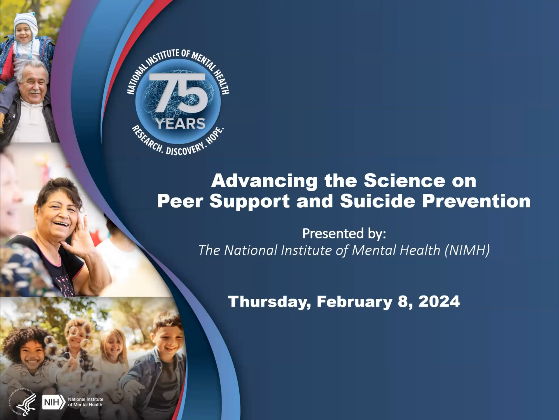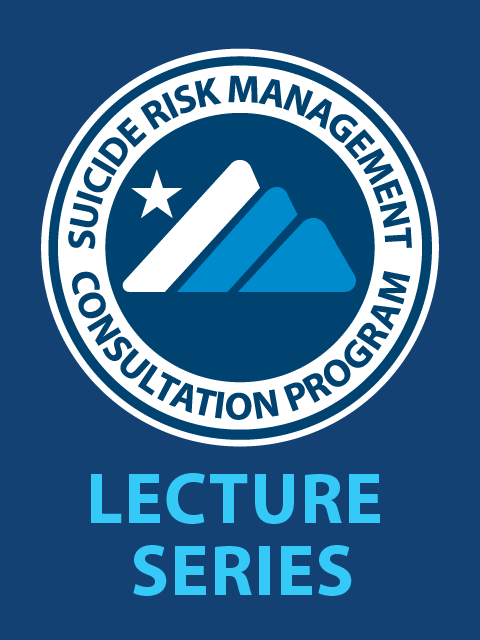10: Peer-to-Peer Programs
Risk Management and Treatment » Non-pharmacologic Interventions
10: Peer-to-Peer Programs
There is insufficient evidence to recommend for or against peer-to-peer programs to reduce suicidal ideation.
Strength:
Neither for or against
Category:
ReviewedNew-added
Grades and Definitions
- Strong for
- or "We recommend offering this option …"
- Weak for
- or "We suggest offering this option …"
- No recommendation
- or "There is insufficient evidence …"
- Weak against
- or "We suggest not offering this option …"
- Strong against
- or "We recommend against offering this option …"
Categories and Definitions |
||
|---|---|---|
| Evidence Reviewed* | Recommendation Category* | Definition* |
| Reviewed | New-added | New recommendation following review of the evidence |
| New-replaced | Recommendation from previous CPG that has been carried over to the updated CPG that has been changed following review of the evidence | |
| Not changed | Recommendation from previous CPG that has been carried forward to the updated CPG where the evidence has been reviewed but the recommendation is not changed | |
| Amended | Recommendation from the previous CPG that has been carried forward to the updated CPG where the evidence has been reviewed and a minor amendment has been made | |
| Deleted | Recommendation from the previous CPG that has been removed based on review of the evidence | |
| Not reviewed | Not changed | Recommendation from previous CPG that has been carried forward to the updated CPG, but for which the evidence has not been reviewed |
| Amended | Recommendation from the previous CPG that has been carried forward to the updated CPG where the evidence has not been reviewed and a minor amendment has been made | |
| Deleted | Recommendation from the previous CPG that has been removed because it was deemed out of scope for the updated CPG | |
| *Adapted from the NICE guideline manual (2012): The guidelines manual. London: National Institute for Health and Care Excellence;2012. and Martinez Garcia L, McFarlane E, Barnes S, Sanabria AJ, Alonso-Coello P, Alderson P. Updated recommendations: An assessment of NICE clinical guidelines. Implement Sci. 2014;9:72. | ||
Recommendation Resources
Peer-to-peer (P2P) programs use non-medical supports, such as friends, family and colleagues to act as first responders to identify individuals in crisis and help connect them to professional care. Although significant interest exists in these programs, currently there is insufficient evidence to determine if P2P interventions prevent suicide deaths.
Training and Clinical Resources
This section includes recommended trainings and/or clinical resources about peer-to-peer programming and suicide prevention.
- Advancing the Science on Peer Support and Suicide Prevention
 Session 3: Peer Support Tailored for Active Duty and Veteran Service Members is particularly relevant. Presented by The National Institute of Mental Health.
Session 3: Peer Support Tailored for Active Duty and Veteran Service Members is particularly relevant. Presented by The National Institute of Mental Health.- Peer Support Services in VA
- All peer specialists in the Department of Veterans Affairs (VA) work in the Veterans Health Administration (VHA) branch of VA. The peer specialist profession is a mental health care profession within VHA, not a program, and like other mental health professional disciplines, is dispersed throughout VHA services across the enterprise. Over the years, VHA has hired hundreds of Veterans as peer specialists and is now the single largest employers of peer specialists in the United States. Peer specialists are professionally trained, through their required peer specialist certification, to effectively use their personal lived experience with recovery to inspire hope and serve as relatable role models of recovery for other Veterans. They assist Veterans with identifying their personal strengths, needed resources, and desirable skills that support their personal goals. Peer specialists use a host of recovery tools to help Veterans of diverse ages, genders, races, and ethnic backgrounds to enhance healthy coping strategies and improve self-management skills over their health conditions.
Webinars
This section includes recommended webinars about peer-to-peer programming to reduce suicidal ideation.
-
 Suicide Prevention: The Impact of Peer Support Presented by Crystal Tabor, Lead VA Peer Support
Suicide Prevention: The Impact of Peer Support Presented by Crystal Tabor, Lead VA Peer Support  The Role of Peer Support Services in Caring for Those at Risk of SuicideHosted by Zero Suicide Initiative
The Role of Peer Support Services in Caring for Those at Risk of SuicideHosted by Zero Suicide Initiative  Integrating Peers into Suicide Prevention Presented by Dr. Paul Pfeiffer
Integrating Peers into Suicide Prevention Presented by Dr. Paul Pfeiffer
Articles
This section includes recommended articles about peer-to-peer programs.
- (2019). Utilization of peer-based substance use disorder and recovery interventions in rural emergency departments: Patient characteristics and exploratory analysis. Journal of Rural Mental Health, 43(1). 17-29. https://psycnet.apa.org/record/2018-60097-001
- (2016). Peer-delivered recovery support services for addictions in the United States: A systematic review. Journal of Substance Abuse Treatment, 63. 1-9. https://doi.org/10.1016/j.jsat.2016.01.003
- (2021). Veteran peer suicide prevention: A community-based peer prevention model. Suicide & life-threatening behavior, 51(2). 358–367. https://doi.org/10.1111/sltb.12712
- (2020, April 28). Veterans Health Administration peer providers national evaluation: Providers, care, and patients served, FY2015-Fy2018Q2, summary findings. This program evaluation report is available upon request by contacting Patricia.Sweeney@va.gov at VHA OMH.
- (2024). Suicide Prevention by Peers Offering Recovery Tactics (SUPPORT) for US Veterans with Serious Mental Illness: Community Engagement Approach. Journal of participatory medicine, 16. e56204. https://doi.org/10.2196/56204
- (2015). A cluster randomized trial of adding peer specialists to intensive case management teams in the Veterans Health Administration. The journal of behavioral health services & research, 42(1). 109–121. https://doi.org/10.1007/s11414-013-9343-1
- (2021). Peer Companionship for Mental Health of Older Adults in Primary Care: A Pragmatic, Nonblinded, Parallel-Group, Randomized Controlled Trial. The American journal of geriatric psychiatry: official journal of the American Association for Geriatric Psychiatry, 29(8). 748–757. https://doi.org/10.1016/j.jagp.2020.05.021
- (2023). Future-Oriented Group Training for suicidal individuals: A randomized controlled trial. Suicide & life-threatening behavior, 53(2). 270–281. https://doi.org/10.1111/sltb.12944
- (2018). Veteran Coffee Socials: A Community-Building Strategy for Enhancing Community Reintegration of Veterans. Community mental health journal, 54(8). 1189–1197. https://doi.org/10.1007/s10597-018-0288-y
- (2018). Three Nontraditional Approaches to Improving the Capacity, Accessibility, and Quality of Mental Health Services: An Overview. Psychiatric services (Washington, D.C.). 69(5), 508–516. https://doi.org/10.1176/appi.ps.201700292
- (2019). Peer support in an outpatient program for veterans with posttraumatic stress disorder: Translating participant experiences into a recovery model. Psychological services, 16(3). 415–424. https://doi.org/10.1037/ser0000269
- (2019). Peer specialists: Exploring the influence of program structure on their emerging role. Psychological services, 16(3). 445–455. https://doi.org/10.1037/ser0000250
- (2019). Development and pilot study of a suicide prevention intervention delivered by peer support specialists. Psychological services, 16(3). 360–371. https://doi.org/10.1037/ser0000257
- (2017). Which Homeless Veterans Benefit From a Peer Mentor and How?. Journal of clinical psychology, 73(9). 1027–1047. https://doi.org/10.1002/jclp.22407
- (2021). Effectiveness of the Veteran X peer-led mental health recovery program: A quasi-experimental study. Psychiatric rehabilitation journal, 44(4). 365–372. https://doi.org/10.1037/prj0000482




















